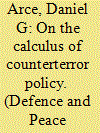|
|
|
Sort Order |
|
|
|
Items / Page
|
|
|
|
|
|
|
| Srl | Item |
| 1 |
ID:
172141


|
|
|
|
|
| Summary/Abstract |
In democratic societies, elections can act as a referendum on politicians’ counterterror policy. At the same time, counterterror policy is conducted under conditions of asymmetric information because the government is better informed about the nature of the threat than is the public. Using a hybrid signaling model, this paper characterizes counterterror policy in terms of its instrumental efficacy against terrorists, and also non-instrumental considerations such as the electoral consequences of policy failures. In addition, the equilibria capture the difficulties that voters have in assessing the appropriateness of policy in the absence of terrorism.
|
|
|
|
|
|
|
|
|
|
|
|
|
|
|
|
| 2 |
ID:
106027


|
|
|
|
|
| Publication |
2011.
|
| Summary/Abstract |
Experimental research has a long-established tradition in psychology and sociology, and a more recent but important history as a useful methodology in economics. In this article, we discuss the strengths and weaknesses of experiments as a method for studying terrorism and other national security topics. For example, given the paucity of data on counterterror policy decisions by governments, as well as for planning, targeting and selecting methods of attack by terrorist organizers, the experimental approach can substitute for this lack of field data. Experiments can also identify policy counterfactuals that might otherwise be unobservable. Hence, we begin by discussing several theoretical themes in the analysis of terrorism: interdependent security games such as airline screening; the dual nature of pre-emptive versus deterrent counterterror policies and the implications of this duality for policy coordination among targeted nations; the resurgence of interest in Colonel Blotto games when properly adjusted to reflect the asymmetric conflict between target governments and terrorist groups; and the relationship between terrorist activity and extreme punishments (or vendettas). The small but emerging literature using experiments to examine these issues is reviewed, paying particular attention to how experimental results can inform theory and policy. Finally, we propose new directions for researchers to explore.
|
|
|
|
|
|
|
|
|
|
|
|
|
|
|
|
| 3 |
ID:
094739


|
|
|
|
|
| Publication |
2010.
|
| Summary/Abstract |
This article presents a signaling model of terrorist attacks, where the target government faces a trade-off from its counterterrorism responses and the backlash (counterreaction) that such responses incite. An endogenous characterization of terrorist spectaculars is specified, given a government's counterterrorism stance and the potential for backlash attacks. In particular, spectacular attacks are pooling, rather than separating, phenomena, whereby the government cannot discern, based on past attacks, the militancy of the terrorist group. The definition for ''spectacular'' terrorist attacks is inversely related to the government's toughness and its belief that it confronts a militant group. Policy recommendations are specified for non-event-specific intelligence in relation to the avoidance of spectacular attacks or unnecessary concessions. Intelligence must be focused on the propensity for counterterrorism to give rise to a backlash attack.
|
|
|
|
|
|
|
|
|
|
|
|
|
|
|
|
|
|
|
|
|